北师版(2019)必修第二册Unit6The admirable Lesson 2 History Makers 课件(共20张PPT)
文档属性
| 名称 | 北师版(2019)必修第二册Unit6The admirable Lesson 2 History Makers 课件(共20张PPT) | 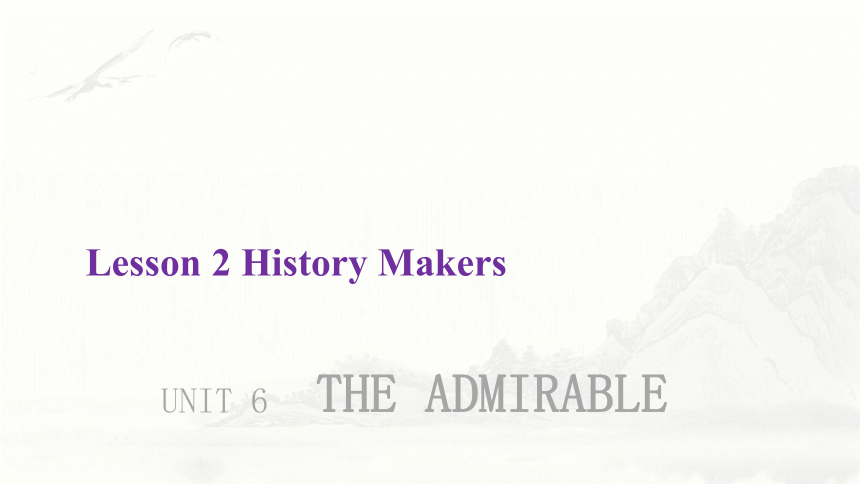 | |
| 格式 | pptx | ||
| 文件大小 | 16.5MB | ||
| 资源类型 | 教案 | ||
| 版本资源 | 北师大版(2019) | ||
| 科目 | 英语 | ||
| 更新时间 | 2024-03-26 09:50:46 | ||
图片预览

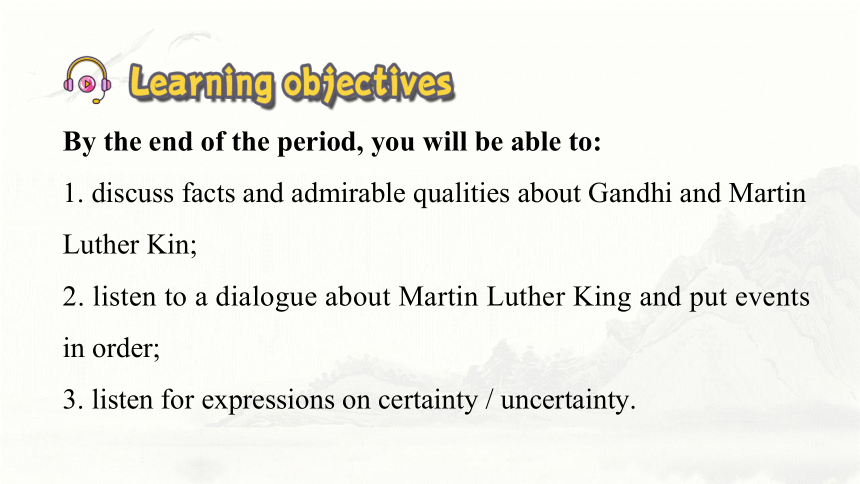
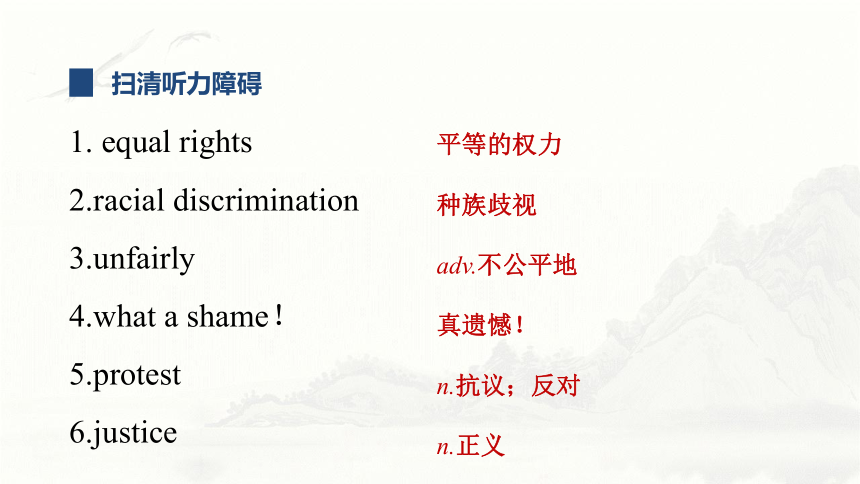



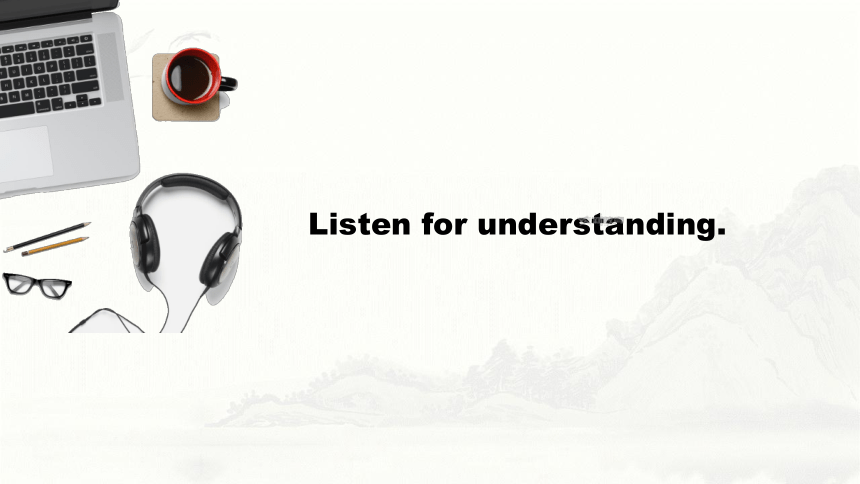

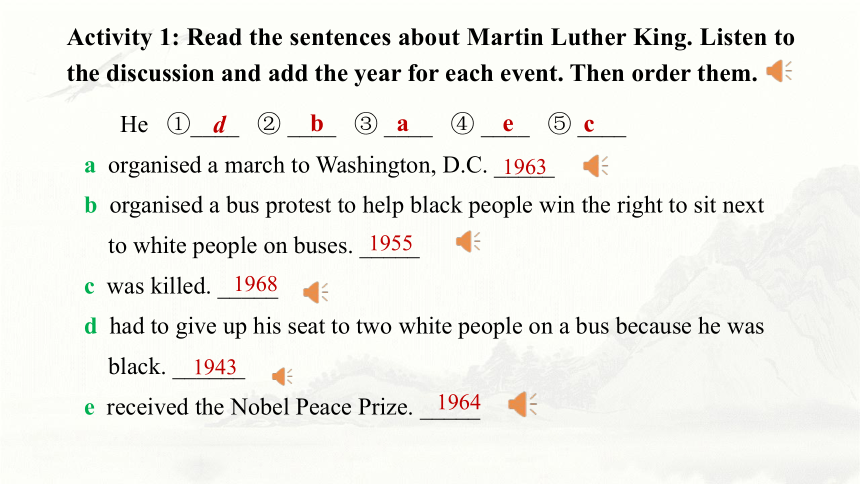
文档简介
(共20张PPT)
UNIT 6
THE ADMIRABLE
Lesson 2 History Makers
By the end of the period, you will be able to:
discuss facts and admirable qualities about Gandhi and Martin Luther Kin;
2. listen to a dialogue about Martin Luther King and put events in order;
3. listen for expressions on certainty / uncertainty.
1. equal rights
2.racial discrimination
3.unfairly
4.what a shame!
5.protest
6.justice
平等的权力
种族歧视
adv.不公平地
真遗憾!
n.抗议;反对
n.正义
扫清听力障碍
7.behind bars
8.self-evident
9.march
10.impressive
11.figure
12.independence
在牢里
adj.显而易见的
n.示威游行,抗议游行
adj.令人钦佩的,给人印象深刻的
n.人物
n.独立
What do you know about Gandhi and Martin Luther King Pick out the right information for each of them. Write G for Gandhi and K for King.
Activate and Share
( ) 1 He fought to win equal rights for black people in the US.
( ) 2 He led his country to independence from British rule.
( ) 3 He organised peaceful protests.
( ) 4 He suffered racial discrimination in South Africa.
( ) 5 He gave a famous and inspiring speech with the words
“I have a dream”.
( ) 6 He was put behind bars many times.
( ) 7 He inspired people around the world to fight for equal rights
and justice.
( ) 8 He won the Nobel Peace Prize.
K
G
K/G
K/G
K
K/G
K/G
K
Listen for understanding.
Understanding Sequencing
Sequencing is the order in which things happen.
When listening, pay attention to words related to order and sequence, e.g. first, after, the next year, later, in the end.
Make a note of any specific dates or time expressions, e.g. today, January, in 1995.
Skill Builder
Activity 1: Read the sentences about Martin Luther King. Listen to the discussion and add the year for each event. Then order them.
He ①____ ② ____ ③ ____ ④ ____ ⑤ ____
a organised a march to Washington, D.C. _____
b organised a bus protest to help black people win the right to sit next
to white people on buses. _____
c was killed. _____
d had to give up his seat to two white people on a bus because he was
black. ______
e received the Nobel Peace Prize. _____
d
1963
1955
1968
1943
1964
b
a
e
c
What did he suffer He suffered____________________.
What did he do He organized_________________________
__________________________________________________.
He helped black people_________________ __________________________.
What did he achieve He received ____________________.
He inspired people around the world_____________________________.
Activity 2: Listen again. Complete the answers to the questions
about Martin Luther King.
racial discrimination
a bus protest, many peaceful protests, a march to Washington D.C. and made a speech
win the right to sit next to white people on buses
the Nobel Peace Prize
to fight for equal rights and justice
I: Yes, that’s a really __________________ speech! For example, “I have a dream that one day ... We hold __________ to be self-evident: that all men are created _____... I have a dream that my four little children will one day live in a nation where they will not ____________ by the colour of their skin but by the content of their __________...”
famous and inspiring
these truths
be judged
character
equal
Activity 3: Listen to the part and fill in the blanks.
1943
1955
1963
1964
1968
He was asked to give his seat to white people on the bus.
He organised a bus protest and won the right for black people to sit next to white people.
He organised a march to Washington D.C. and gave a speech with the words “I have a dream”.
He received the Nobel Peace Prize.
He was killed.
Activity 4: Pair Work Talk about what Martin Luther King did in the following years.
Focus on function:
Expressing Certainty and Uncertainty
Activity 1: Listen to the conversation between two students. Why does the girl suggest that they talk about Gandhi in their project
Because she admires and respects him and thinks he was one of the most important figures of the 20th century.
Activity 2: Listen again. Are they certain or uncertain How do you know
1. The girl is certain / uncertain that Gandhi was one of the most important figures of the 20th century.
2. The girl is certain / uncertain about the date of India’s independence.
3. The boy is certain / uncertain that Gandhi inspired Martin Luther King.
4. The girl is certain / uncertain that Gandhi inspired Martin Luther King.
5. The boy is certain / uncertain that Gandhi did not win the Nobel Peace Prize.
There’s no doubt that…
I’m not sure about…
Really Are you sure about that
Yes, I’m certain.
I don’t know if that’s true…
Expressing Certainty and Uncertainty
Talk Builder
Activity 3: Listen and plete the Talk Builder.
Certainty
_______________ that he was one of the most important
figures of the 20th century.
2 Yes, I ___________.
3 Actually, I _____________ Gandhi ever won a Nobel Peace
Prize.
4 I’m pretty ________ he didn’t.
Uncertainty
1 _____________ about the exact date.
2 _______ Are you ______________
3 _____________ if that’s true…
4 _________ we should check a few other websites.
There’s no doubt
am certain
don’t think
sure
I’m not sure
Really
sure about that
I don’t know
Perhaps
Activity 4: Listen to the passage again and filling in the blanks.
(G=Girl B=Boy)
G: So, for our school project, maybe we can talk about Gandhi I really admire and respect him, and there’s no doubt that he was one of the most important ___________ of the 20th century.
B: Great idea! Let me ____________ some notes. So, let’s first talk about why he was so important.
G: OK. Well, Gandhi led India to ___________ from British rule... mmm, I’m not sure about the exact date.
B: The date... mmm. Oh, I can check this on my phone... India became an independent country in 1947.
G: Right, it was 1947. Gandhi was important also because he believed in ____________ peaceful protests where no one was hurt. He inspired many people, including Martin Luther King.
figures
write down
independence
the power of
B: Really Are you sure about that
G: Yes, I’m certain. I learnt this on a radio programme the other day.
B: Oh! I didn’t know about that. And I guess we should also mention Gandhi’s Nobel Peace Prize.
G: Actually, I don’t think Gandhi ever won a _________________.
B: Mmm... I don’t know if that’s true...
G: I’m pretty sure he didn’t. Look, here, read this web page.
B: Right. But perhaps we should check a few ______________. Sometimes the information on the Internet can be wrong.
G: OK. Let me find a few _____________...
Nobel Peace Prize
other websites
more sources
Activity 5: Choose a person whom you regard as a history maker for China. Search online and find information about him/ her. Make a short presentation about the person.
Show time
UNIT 6
THE ADMIRABLE
Lesson 2 History Makers
By the end of the period, you will be able to:
discuss facts and admirable qualities about Gandhi and Martin Luther Kin;
2. listen to a dialogue about Martin Luther King and put events in order;
3. listen for expressions on certainty / uncertainty.
1. equal rights
2.racial discrimination
3.unfairly
4.what a shame!
5.protest
6.justice
平等的权力
种族歧视
adv.不公平地
真遗憾!
n.抗议;反对
n.正义
扫清听力障碍
7.behind bars
8.self-evident
9.march
10.impressive
11.figure
12.independence
在牢里
adj.显而易见的
n.示威游行,抗议游行
adj.令人钦佩的,给人印象深刻的
n.人物
n.独立
What do you know about Gandhi and Martin Luther King Pick out the right information for each of them. Write G for Gandhi and K for King.
Activate and Share
( ) 1 He fought to win equal rights for black people in the US.
( ) 2 He led his country to independence from British rule.
( ) 3 He organised peaceful protests.
( ) 4 He suffered racial discrimination in South Africa.
( ) 5 He gave a famous and inspiring speech with the words
“I have a dream”.
( ) 6 He was put behind bars many times.
( ) 7 He inspired people around the world to fight for equal rights
and justice.
( ) 8 He won the Nobel Peace Prize.
K
G
K/G
K/G
K
K/G
K/G
K
Listen for understanding.
Understanding Sequencing
Sequencing is the order in which things happen.
When listening, pay attention to words related to order and sequence, e.g. first, after, the next year, later, in the end.
Make a note of any specific dates or time expressions, e.g. today, January, in 1995.
Skill Builder
Activity 1: Read the sentences about Martin Luther King. Listen to the discussion and add the year for each event. Then order them.
He ①____ ② ____ ③ ____ ④ ____ ⑤ ____
a organised a march to Washington, D.C. _____
b organised a bus protest to help black people win the right to sit next
to white people on buses. _____
c was killed. _____
d had to give up his seat to two white people on a bus because he was
black. ______
e received the Nobel Peace Prize. _____
d
1963
1955
1968
1943
1964
b
a
e
c
What did he suffer He suffered____________________.
What did he do He organized_________________________
__________________________________________________.
He helped black people_________________ __________________________.
What did he achieve He received ____________________.
He inspired people around the world_____________________________.
Activity 2: Listen again. Complete the answers to the questions
about Martin Luther King.
racial discrimination
a bus protest, many peaceful protests, a march to Washington D.C. and made a speech
win the right to sit next to white people on buses
the Nobel Peace Prize
to fight for equal rights and justice
I: Yes, that’s a really __________________ speech! For example, “I have a dream that one day ... We hold __________ to be self-evident: that all men are created _____... I have a dream that my four little children will one day live in a nation where they will not ____________ by the colour of their skin but by the content of their __________...”
famous and inspiring
these truths
be judged
character
equal
Activity 3: Listen to the part and fill in the blanks.
1943
1955
1963
1964
1968
He was asked to give his seat to white people on the bus.
He organised a bus protest and won the right for black people to sit next to white people.
He organised a march to Washington D.C. and gave a speech with the words “I have a dream”.
He received the Nobel Peace Prize.
He was killed.
Activity 4: Pair Work Talk about what Martin Luther King did in the following years.
Focus on function:
Expressing Certainty and Uncertainty
Activity 1: Listen to the conversation between two students. Why does the girl suggest that they talk about Gandhi in their project
Because she admires and respects him and thinks he was one of the most important figures of the 20th century.
Activity 2: Listen again. Are they certain or uncertain How do you know
1. The girl is certain / uncertain that Gandhi was one of the most important figures of the 20th century.
2. The girl is certain / uncertain about the date of India’s independence.
3. The boy is certain / uncertain that Gandhi inspired Martin Luther King.
4. The girl is certain / uncertain that Gandhi inspired Martin Luther King.
5. The boy is certain / uncertain that Gandhi did not win the Nobel Peace Prize.
There’s no doubt that…
I’m not sure about…
Really Are you sure about that
Yes, I’m certain.
I don’t know if that’s true…
Expressing Certainty and Uncertainty
Talk Builder
Activity 3: Listen and plete the Talk Builder.
Certainty
_______________ that he was one of the most important
figures of the 20th century.
2 Yes, I ___________.
3 Actually, I _____________ Gandhi ever won a Nobel Peace
Prize.
4 I’m pretty ________ he didn’t.
Uncertainty
1 _____________ about the exact date.
2 _______ Are you ______________
3 _____________ if that’s true…
4 _________ we should check a few other websites.
There’s no doubt
am certain
don’t think
sure
I’m not sure
Really
sure about that
I don’t know
Perhaps
Activity 4: Listen to the passage again and filling in the blanks.
(G=Girl B=Boy)
G: So, for our school project, maybe we can talk about Gandhi I really admire and respect him, and there’s no doubt that he was one of the most important ___________ of the 20th century.
B: Great idea! Let me ____________ some notes. So, let’s first talk about why he was so important.
G: OK. Well, Gandhi led India to ___________ from British rule... mmm, I’m not sure about the exact date.
B: The date... mmm. Oh, I can check this on my phone... India became an independent country in 1947.
G: Right, it was 1947. Gandhi was important also because he believed in ____________ peaceful protests where no one was hurt. He inspired many people, including Martin Luther King.
figures
write down
independence
the power of
B: Really Are you sure about that
G: Yes, I’m certain. I learnt this on a radio programme the other day.
B: Oh! I didn’t know about that. And I guess we should also mention Gandhi’s Nobel Peace Prize.
G: Actually, I don’t think Gandhi ever won a _________________.
B: Mmm... I don’t know if that’s true...
G: I’m pretty sure he didn’t. Look, here, read this web page.
B: Right. But perhaps we should check a few ______________. Sometimes the information on the Internet can be wrong.
G: OK. Let me find a few _____________...
Nobel Peace Prize
other websites
more sources
Activity 5: Choose a person whom you regard as a history maker for China. Search online and find information about him/ her. Make a short presentation about the person.
Show time
同课章节目录
- Unit 4 Information technology
- Lesson 1 Avatars
- Lesson 2 Apps
- Lesson 3 Internet and Friendships
- Unit 5 Humans and nature
- Lesson 1 A Sea Story
- Lesson 2 Professional Rescue Team
- Lesson 3 Race to the Pole
- Unit 6 The admirable
- Lesson 1 A Medical Pioneer
- Lesson 2 History Makers
- Lesson 3 The Superhero Behind Superman
